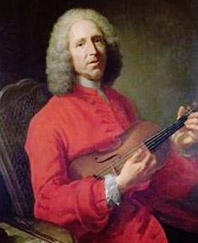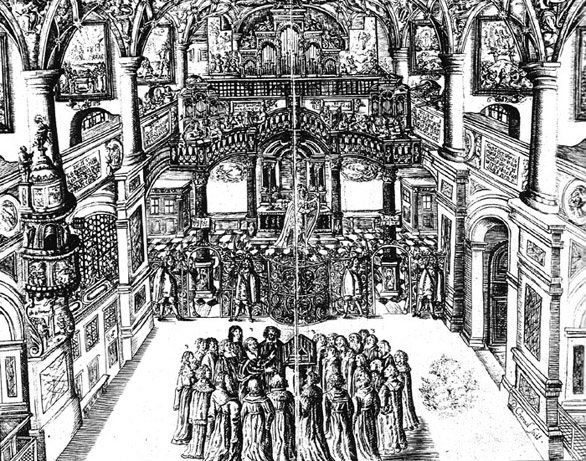Joan—Philippe Rameau was born in Dijon, one of
11 children, and studied at a Jesuit College - It is father's initial intention
being that he should become a lawyer — before being allowed to go
to study music in Milan at the age of 18. After a number of
appointments as organist, he settled in Clermont m 1715, where he
was organist at the cathedral for eight years.
During this period Rameau wrote his first collection of
harpsichord pieces and m 1722 published his book on music theory,
Treatise on harmony. He tried to move to Paris, the centre
of creative activity, but encountered resistance from his
employers in Clermont. It is said that on a particular feast day
he simply refused to play, and when pressed, performed with so
many discordant notes that he was released from duty. He moved to
Paris but for a decade he failed to secure a formal position,
although he continued to compose, and published his second and
third books of harpsichord works. He made a living by teaching
music, in 1732 becoming organist at Ste Croix-de-la-13retonnerie
and the following year at the Jesuit novitiate.
Rameau s desire to write an opera received help from an admirer
- the wife of a financier, Le Riche de la Poupliniere, who funded
a private orchestra. Through this circle the composer met the
writer Abbe Simon-Joseph Pellegrin, and together they created his
first opera,
Hippolyte et Aricie, based on Racine's tragedy Phedre.
It was performed in 1733 at Poupliniere's residence, and then
at the Opera in Paris three months later.
Rameau was 50 when his Hippolyte et Aricie was performed
and he spent the rest of Ins working life producing operas. In
these lie stressed musical elements more than Lully had done,
stating, "Lully needs actors but I need singers." Les
Indes galantes in 1735 and Castor et Pollux m 1737 were
great successes, showing Rameau's bold harmonies and establishing
him as Lully's successor as the leading light of French opera. A
comic opera, Platee, was also successful when performed at
the Paris Opera in 1745, m part because it parodied the set
language and conventions of serious opera. Some of its jests were
sentimental words set to inappropriate music, incorrect stress of
words or syllables, and the use of "unoperatic" phrases and
expressions.
Rameau died just before his eighty-first birthday, shortly after
Louis XV, in recognition of his long service and lifetime of
creative effort, made him Composieur du Cabinet du Roy.
His death was marked by a number of memorial services, the passion
and vibrance of his music ensuring a great sense of loss at his
passing.
|



No comments:
Post a Comment